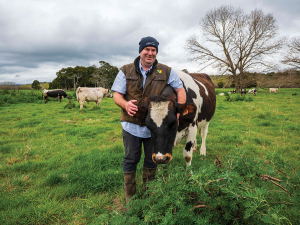OPINION: Entering Parliament back in 2023, I wanted to help put the fun back in farming. After six years of Labour, rural New Zealand was tired of the relentless waves of red tape and compliance, draining joy from people who just want to work the land.
Since then, we’ve scrapped the requirement for councils to impose new SNAs, axed the ute tax, ensured methane is measured correctly, kept ag out of the ETS or any form of emissions pricing, and more.
Work is underway to fix the broken health and safety system, improve labour laws, and we continue to cut red tape in a number of other areas.
But I’d be lying if I said there wasn’t still a hell of a lot left to do.
The Resource Management Act remains the biggest barrier to our country’s prosperity and we’re working hard to bring in a replacement based on property rights.
But to create a workable system that brings certainty and longevity will take time to get right, so in the meantime we’ve been doing some panelbeating to at least get the current regime into better shape.
Last month, Parliament passed one of those important changes – making significant improvements to the freshwater farm plan system.
After previously pausing the roll-out of Labour’s unworkable farm plans, we’ve managed to get to a new system that is workable, affordable and grounded in reality.
It reduces the need for mountains of paperwork, costly consents and unnecessary duplication of the great work farmers are already doing.
Here’s what’s changed. First, the Minister for the Environment can now approve industry organisations to certify and audit plans. That means if you’re already part of a robust assurance scheme like Fonterra’s Tiaki or HortNZ’s NZGAP, you won’t be forced to do it all over again for the council.
Second, the threshold for needing a farm plan has been lifted. Previously, farms as small as 20 hectares were dragged into the system. Now the minimum is 50ha for sheep and beef, arable, orchards, and viticulture. That frees about 8000 lower-risk farms from the requirement altogether.
And importantly, farm plans will now be built around actual risk on-farm, not dreamed-up rules from Wellington. In many situations that would have required a consent under the old system, farmers will simply be able to detail their good management practices in their farm plan – no extra consent needed.
Most farmers I meet want to do right, but they don’t want a pile of stupid rules and regulations trying to make them do that. By giving the farmer ownership of their farm plan they can ensure it is practical, tailored to their farm, their catchment and their situation.
This will enable farmers to continue farming without unnecessary consents while also taking practical steps to improve the natural environment.
Some may argue that we should have scrapped farm plans altogether. But the way I see it is that we have two paths.
We can either take the farm plans and catchment care groups route, or we can do what Labour and the Greens want with strict limits, input controls and heavy-handed regulations that only ever rachet up. I know what I’m choosing.
We know from catchments that have adopted practical farm plans that collaboration and tailored solutions actually work.
Farmers don’t need Wellington telling them how to farm. They need rules that make sense, recognise the good work already being done, and let them get on with the job. That’s what we’ve delivered with these reforms.
Andrew Hoggard is the Associate Minister for Agriculture.


















